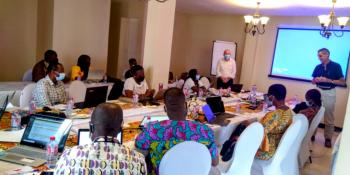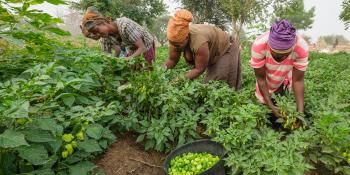To scale up the Climate-Smart Village approach, capacitating actors is essential

CCAFS has trained its partners in West Africa on the Climate-Smart Village approach, to facilitate its scaling-up
The CCAFS program has developed 15 Climate-Smart Villages (CSVs) in a pilot phase in five regions of the world (Latin America, West Africa, East Africa, South Asia and Southeast Asia). CSVs are a means of agricultural research for development to identify, develop and test with communities their climate-smart agriculture (CSA) options in the context of climate change.
CSV is an approach that can help improve the living and working conditions of thousands of farmers. To help achieve this, the CGIAR Research Prorgam on Climate Change, Agriculture and Food Security (CCAFS), the Sakakawa Africa Association (SAA) and the Mali National Institute of Agricultural Research of Mali (IER) have begun a fruitful partnership. To solidify and enhance the partnership, SAA staff were trained by a CCAFS team on how to successfully implement a CSV.
So how is a CSV implemented? And prior to implementing a CSV, what factors should be taken into account? What is the best way to conduct baseline studies? During the CSV training workshop (May 21-22, 2018), participants had the opportunity to get answers to these and other questions.
Over two days of presentations, lively exchanges and simulations, the 12 participants (including researchers, development agents, and agricultural technicians) learned about the CSV vision, its characteristics and its components before reviewing the implementation stages of the CSV approach. Similarly, they learned how to conduct baseline studies and vulnerability assessments, both prerequisites for effective implementation of a CSV. The occasion also allowed participants to share CCAFS' experiences in CSV development. At the end of these two days of capacity building, key concepts related to climate change, agriculture and food security were now familiar.
In West Africa, in collaboration with partners, CCAFS is implementing the CSV approach at five sites considered vulnerable in Burkina Faso, Ghana, Mali, Niger, and Senegal. The objective is to respond to the need for proven and effective CSA options to ensure food security by sustainably increasing productivity and farm incomes, thus improving adaptation and building resilience to the impacts of climate change.
Dansira Dembélé is a Communications Officer at CCAFS West Africa, based at ICRISAT West and Central Africa.



